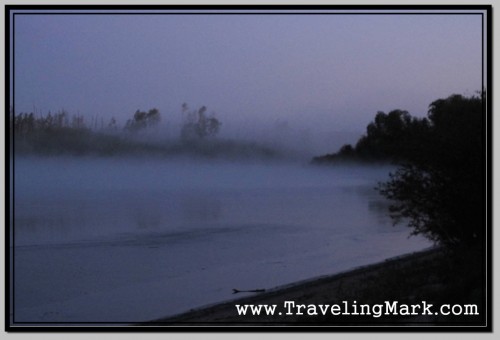One of the earliest things I learned when I left to live as a recluse in the Canadian wilderness was that nights out there are extremely cold even in Summer. I did my hermit experience over the warmest months of the year – June, July and August, but while it was nice and warm during the day, night time temperatures dropped below zero. And since I didn’t anticipate freezing temperatures, I neither had clothes, nor other equipment (sleeping bag, tent or stove) to keep me warm at night.

The lake I chose for my stay away from civilization was very remote, but – to a point – accessible by car. The nearest paved road to the lake was more than 100km away but invasive logging industry left a passage through the forest which I was able to use to get myself closer. Needless to say, this forestry equipment road was full of obstacles and rough terrain that’s normally only negotiable by heavy machinery with continuous tracks, but being a skilled driver and having been blessed with dry weather, I was able to safely traverse this incredibly challenging stretch of the road all the way to the lake.
The entire journey took me about 5 hours to complete, but I was only about 300 km north of Edmonton as the raven fly. I don’t know whether it was these extra 300 km north or the fact that there is no civilization anywhere near the lake, but as someone who spent countless Summer nights outside while living in Edmonton, I can tell you for sure that while it does get cold at night even in Summer, it doesn’t get below freezing. Not in Summer. But as I learned after my first night out in the wilderness (and each night thereafter), despite daytime temperatures reaching pleasant 29 °C, they were followed by night time drops to -3 °C.
5 hour long drive north of Edmonton and you’ll experience brief Winter every night even during Summer months. I personally think this had more to do with complete remoteness of the wilderness than its placement along the longitude. I have not done any scientific research on it, but high concentration of warm bloodied mammals who radiate body heat into the environment surely contributes to keeping the temperature in urban centers warmer than in the wilderness. And it’s not only body heat – you have heat generating car engines, thousands of computers, stoves used for cooking, machines used in factories, people bathing in hot water – so many things to keep the environment warmer… And on top of it all, you have pollution that keeps the heat trapped.
During my first month in the wilderness, it rained almost every afternoon. July was a little better and come August, there was hardly any rain. Sky was cloudless most of the days with sun baking down on me from wee morning hours until late night. Yet even in August, when daytime temperatures were in their 30’s, as soon as the sun was gone, the gauge started dropping rapidly and got to freezing just before the dawn.
Luckily, I had everything I needed to keep the fire going and there was plenty of dry firewood around, plus night only lasts a few hours a day this time of year so even though ill equipped, I kept myself warm-ish by utilizing natural resources. Regardless, it was a lesson I learned the hard way – remote Canadian wilderness can be very cold even in Summer months. Especially at night.
In order to survive, I had to swap night with the day. I got most of my sleep during the day when it was warm and I didn’t have to spend time feeding the fire and when the sun went down, I kept myself entertained by staring at the stars. It’s mind boggling how many of them there are and how clearly they can be seen when you’re away from city lights and pollution.
First night was hands down the worst but I got right down to building a primitive shelter that would tightly wrap around the bed of dry leaves the following day. I kept improving on my natural tent every day, but night time temperature drops were just so severe, I quickly realized that the only way to stay warm at night would be by building a shelter big enough to have a fire inside. If such shelter was well isolated, the fire would keep the interior warm even during freezing nights. One would still need to feed the fire, but pay back in feeling warm over night would be well worth it.
